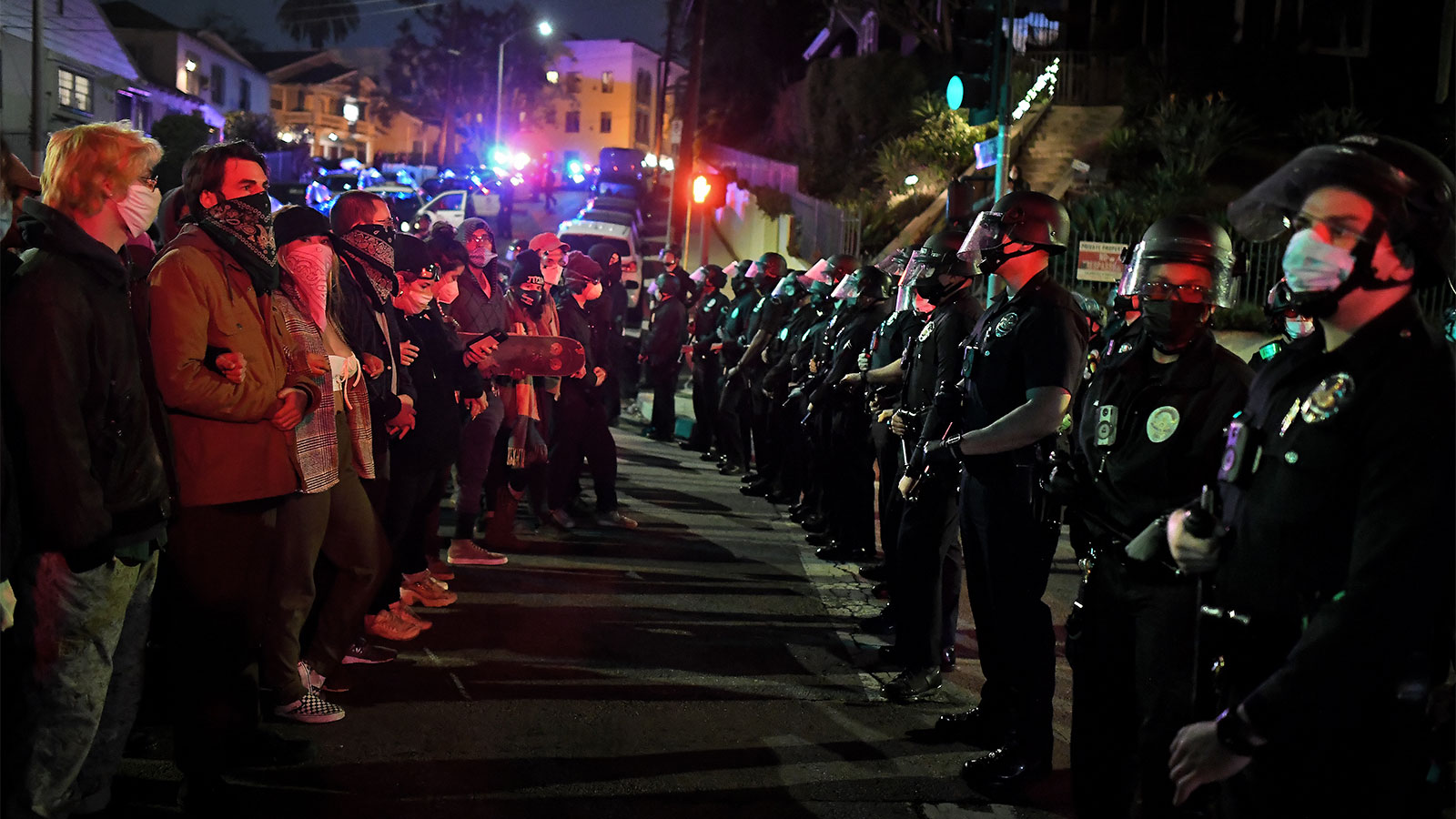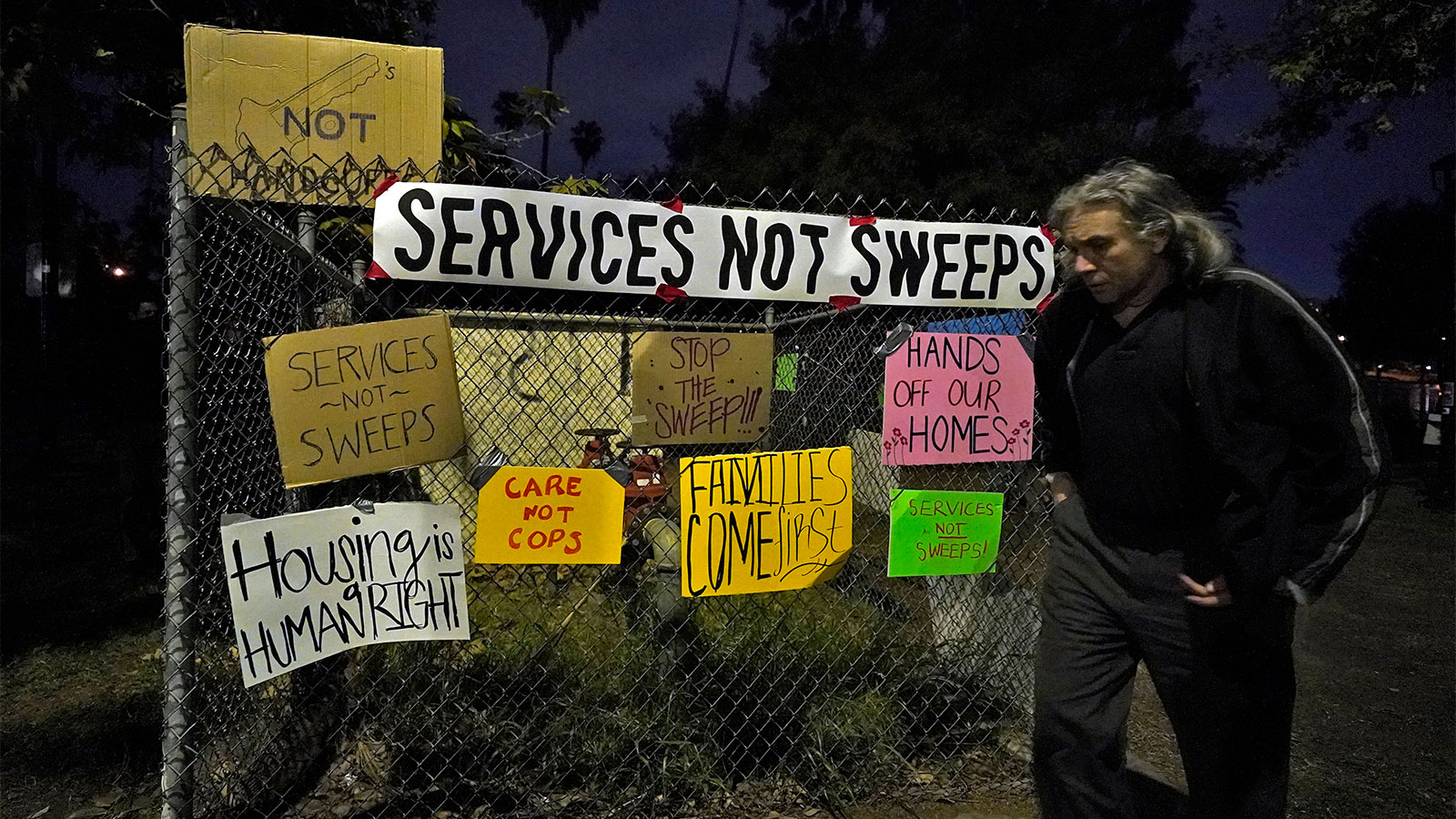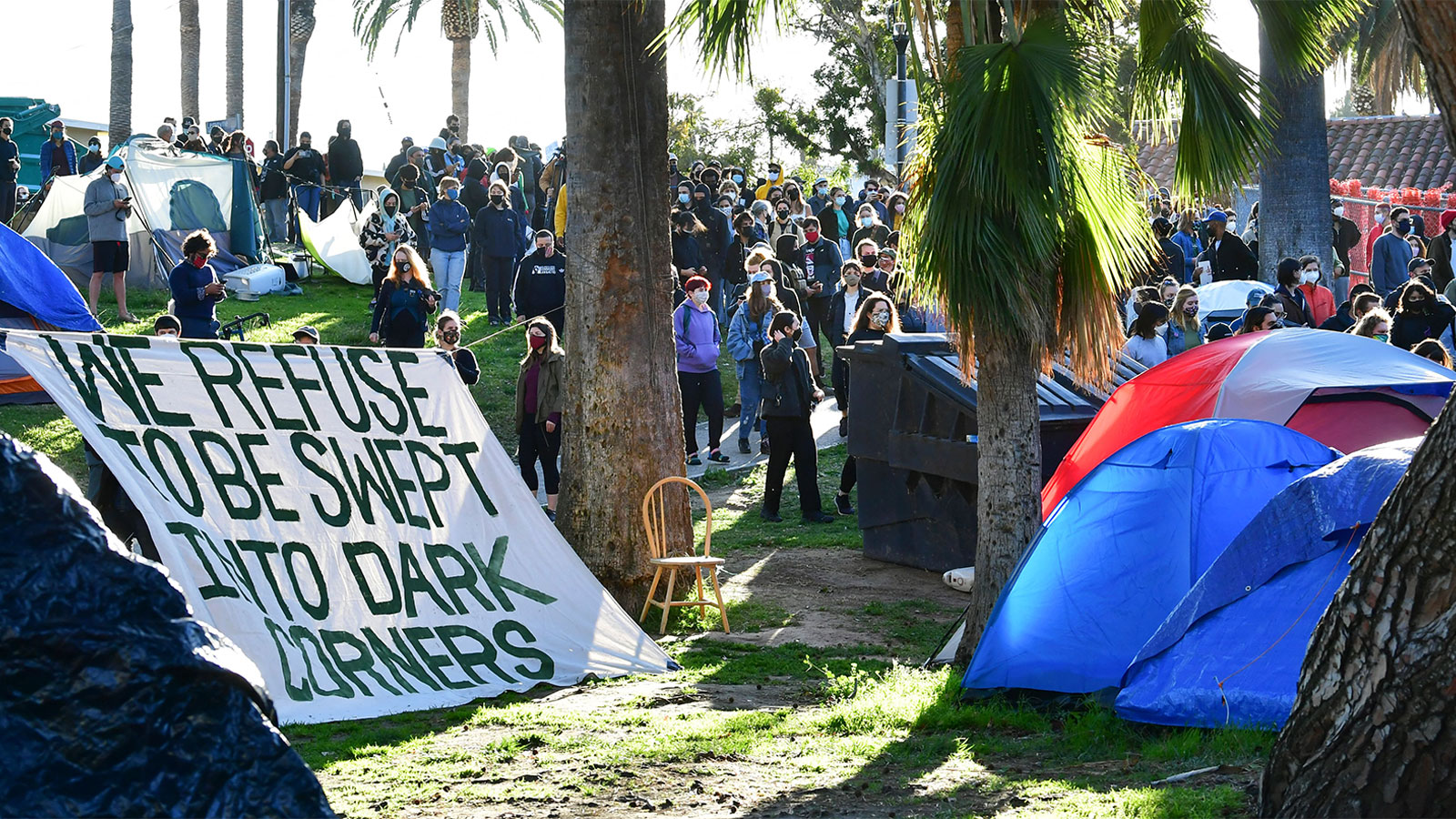A community garden, a jobs program, meal distribution, community clean-ups: These are the amenities and services that unhoused people and mutual aid organizations created in Los Angeles’ Echo Park after coming together in the park last fall. Alongside the lake, with its iconic swan boats, hundreds of unhoused people took shelter during the pandemic, setting up tents against the downtown skyline.
David Busch-Lilly, a local organizer for homeless rights who has himself been unhoused for the past 20 years, told Grist he had never seen anything like it. “The park had become such a peaceful oasis during lockdown,” he said, in large part because the COVID-19 shutdown put a temporary pause on the city’s policy of forcibly removing similar encampments to conduct sidewalk and street cleanings.
But on March 25, the community evaporated in the blink of an eye. Police choppers rumbled in the sky. The city put up chain-link fences to enclose the camp, turning the once-autonomous community into what protestors and residents of the park called an “open-air prison.” At least a dozen people were left trapped inside the park by the fencing.
Hundreds of Angelenos gathered outside the park as the police followed orders from the city council to displace more than 200 residents living in the encampment, despite COVID-19 guidelines from the Centers for Disease Control and Prevention, or CDC, which say that clearing such encampments can increase the risk of viral transmission.
The police’s use of “less-lethal” rubber bullets, batons, and pepper spray reportedly left at least four protestors with concussions and broken limbs. Ultimately, police detained 182 people, including at least three reporters and a group of legal observers. A handful of residents living at the park were also arrested for not agreeing to leave the homes they’d built.
The confrontation at Echo Park poses a question that cities across the country are wrestling with: What role should public green space play in the urban housing shortfalls laid bare by the COVID-19 pandemic? While the coronavirus forced people into their homes, those without housing settled in public spaces for safety, establishing informal communities in newly-freed areas like parks and downtown sidewalks. But as Los Angeles lifts its pandemic restrictions, record-high housing prices and a rise in homelessness are creating a dilemma that city leaders are choosing to address through policing.

Both Mitch O’Farrell, the city council member who represents Echo Park, and Mayor Eric Garcetti called the displacement and police response a “great success.” O’Farrell, who supported the eviction of the encampment, said in a press conference that residents were displaced with “thoughtful and compassionate action” that was necessary to maintain safety at the park. Garcetti has called it “the largest housing transition of an encampment ever in the city’s history.” (The offices of Council Member O’Farrell and Mayor Garcetti did not respond to Grist’s requests for comment in time for publication, and a Los Angeles Police Department spokesperson declined to comment.)
According to O’Farrell, “209 people experiencing homelessness” were moved “into transitional shelter with supportive services, medical care, and other humane and necessary resources.” But according to the Los Angeles Homeless Services Authority, the number was closer to 180. Of those, 138 were temporarily placed in the Project Roomkey program, which provides hotel rooms for unhoused Angelenos. Of those 138, many were back on the street within a matter of days.
Advocates for the unhoused contend that the eviction during the middle of a public health crisis provided a false solution to homelessness, especially when only temporary housing was offered to those evicted. Beyond disregarding the CDC’s guidelines for halting evictions, advocates say the displacement took place in direct violation of United Nations standards stipulating that “informal settlements,” such as tents and camps, should be protected in the same manner as traditional housing.
“Eviction, violent displacement of an unhoused community, is first and foremost an inhumane and ineffective approach to solving homelessness, especially during a pandemic,” Hilary Malson, a researcher who studies housing and displacement at the University of California, Los Angeles, told Grist.
Ananya Roy, director of UCLA’s Institute on Inequality and Democracy, says that L.A.’s emphasis on addressing homelessness through policing has resulted in city ordinances that criminalize sleeping in one’s car or on certain streets, as well as others that limit the amount of personal property that unhoused people can possess. The cumulative result is “a vicious cycle that deepens the precarity and exclusion of unhoused people,” according to Roy.
Many scholars, advocates, and unhoused people believe that Project Roomkey, which launched in March 2020, is an expansion of these criminalizing policies. The program, funded by the federal government, was created to help curb the spread of COVID-19 by offering shelter to the unhoused, who are especially vulnerable to the virus because of their inability to isolate. Despite pledging to deliver 15,000 hotel rooms for unhoused people, L.A. only delivered one-third of that total at the program’s height last September. While participation dwindled due to reports of discrimination against disabled people and punitive rules, the city failed to submit paperwork to get reimbursed for the program by the federal government, leaving an estimated $59 million gap in the city budget.
“It’s very ironic: They call it ‘Project Roomkey,’ but people don’t even get an actual key to their rooms,” Roy told Grist. “They are forced into curfew conditions, searched head to toe before they can even enter what is supposedly their own space.”
As a result of the program’s controversies and failures, it is scheduled to be terminated altogether in September. Earlier in the year, activists suggested that the city reform the program by forcibly commandeering unused hotel rooms for the unhoused, since hotels were so reluctant to offer up their facilities to the program. Now they’re searching for more permanent solutions.
O’Farrell, the city council member, thinks he has an unconventional fix with a $3 million plan to install a “village” of 38 64-square-foot Pallet shelters for unhoused people in Echo Park. The prefabricated shelters, which are known as “tiny homes” and are smaller than most jail cells, will hold two unhoused people each and potentially offer better protection from rain and heat waves. While O’Farrell has offered this as a “humane” solution that could last for years, Theo Henderson, an unhoused Angeleno, told Grist that he doesn’t trust city leaders whose policies have consistently led to more policing in his community.
“We have to stop relying on a city that has criminalized us,” he said. “No matter the idea, it has led to more criminalization for us.”
Malson, who has studied housing justice and encampments during COVID-19, says that in the absence of permanent housing solutions, governments should sanction encampments and provide services that respect “the agency and autonomy of unhoused people” instead of evicting and criminalizing them. That could look like easing restrictions on unhoused people’s right to keep personal property, creating and maintaining washing stations and hygiene facilities, and decriminalizing life in public spaces.
Across the country, including in Los Angeles, encampments are criminalized by ordinances that make it illegal to camp in public parks. According to the National Law Center on Homelessness and Poverty, 57 percent of cities prohibit camping in certain public spaces. Malson says that allowing people to sleep in parks overnight could be a step toward decriminalizing encampments.
“The city could do so much more in making more space available for unhoused people, as far as rezoning parcels as campgrounds, rezoning other green space, such as golf courses and parts of public parks, as spaces for unhoused people,” said Malson. “These sound like outlandish ideas, but they have been done in the past in Los Angeles.”
Indeed, from 1946 to 1954, parts of L.A.’s iconic Griffith Park were home to a settlement called Rodger Young Village that contained 1,500 emergency housing units to house veterans returning from World War II. Malson says the city’s thinking around housing should encompass public green spaces as “resources that can be tapped for the provision of safe shelter.”

Beyond providing respite from displacement and a sense of community to the former residents of the encampment in Echo Park, the green space also offered an enormous mental health benefit, according to Busch-Lilly. “Just the setting, in nature, was so effective in addressing homeless people’s trauma and mental illness,” said Busch-Lilly. “It’s the most effective mental treatment for unhoused people that I, in 20 years, have seen.”
But for now, no one — housed or unhoused — can access the park. Two weeks ago, protesters held a candlelight vigil outside the park, proceeding past the fences that held a sign someone had hung from the wire in a direct rebuke to O’Farrell, the city council member: “This park is the people’s. Not Mitch’s.”
Correction: This article originally misreported David Busch-Lilly’s last name.



